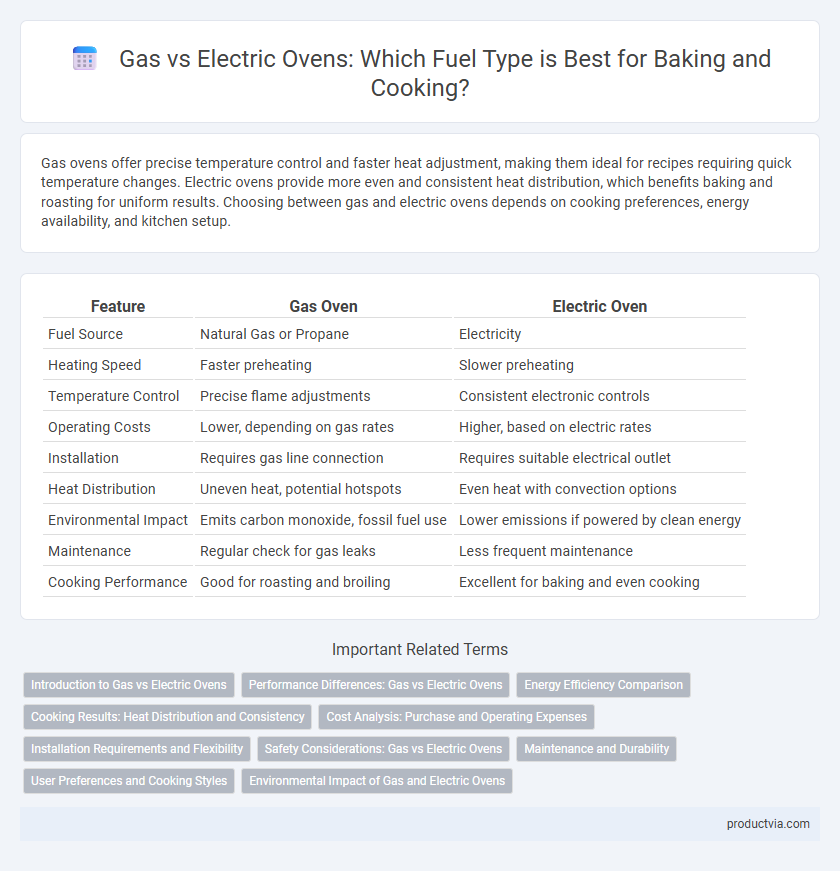Gas ovens offer precise temperature control and faster heat adjustment, making them ideal for recipes requiring quick temperature changes. Electric ovens provide more even and consistent heat distribution, which benefits baking and roasting for uniform results. Choosing between gas and electric ovens depends on cooking preferences, energy availability, and kitchen setup.
Table of Comparison
| Feature | Gas Oven | Electric Oven |
|---|---|---|
| Fuel Source | Natural Gas or Propane | Electricity |
| Heating Speed | Faster preheating | Slower preheating |
| Temperature Control | Precise flame adjustments | Consistent electronic controls |
| Operating Costs | Lower, depending on gas rates | Higher, based on electric rates |
| Installation | Requires gas line connection | Requires suitable electrical outlet |
| Heat Distribution | Uneven heat, potential hotspots | Even heat with convection options |
| Environmental Impact | Emits carbon monoxide, fossil fuel use | Lower emissions if powered by clean energy |
| Maintenance | Regular check for gas leaks | Less frequent maintenance |
| Cooking Performance | Good for roasting and broiling | Excellent for baking and even cooking |
Introduction to Gas vs Electric Ovens
Gas ovens offer rapid heat adjustment and often lower operating costs due to natural gas prices, making them favorable for users seeking precise temperature control. Electric ovens provide more even heat distribution and consistent temperatures, which enhance baking results and require less maintenance. Choosing between gas and electric depends on kitchen setup, fuel availability, and cooking preferences.
Performance Differences: Gas vs Electric Ovens
Gas ovens offer rapid temperature changes and superior moisture retention, making them ideal for roasting and baking dishes requiring a crisp exterior and tender interior. Electric ovens provide consistent, even heat distribution with precise temperature control, resulting in reliable baking outcomes, especially for delicate pastries and baked goods. The choice between gas and electric ovens largely depends on cooking style preferences and the importance of temperature stability versus moisture control.
Energy Efficiency Comparison
Gas ovens typically offer faster preheating and better temperature control, making them more energy-efficient for quick cooking tasks. Electric ovens provide more consistent temperature distribution and retain heat longer, resulting in more efficient slow-cooking and baking processes. Energy consumption depends on factors like insulation quality, usage patterns, and local fuel costs, with electric ovens often favored for their overall energy efficiency in sustained cooking scenarios.
Cooking Results: Heat Distribution and Consistency
Gas ovens provide rapid heat adjustment and moist heat, promoting even cooking and browning, particularly for roasting and baking. Electric ovens deliver consistent, dry heat through heating elements, ensuring stable temperature control ideal for precise baking and slow cooking. Heat distribution in electric ovens tends to be more uniform, reducing hot spots and improving overall cooking consistency compared to gas ovens.
Cost Analysis: Purchase and Operating Expenses
Gas ovens generally have lower purchase prices compared to electric ovens, offering a cost-effective upfront investment. Operating expenses for gas ovens tend to be lower due to the typically cheaper cost of natural gas compared to electricity, leading to reduced monthly utility bills. However, electric ovens often feature higher energy efficiency, which can offset some operational costs despite the higher fuel price.
Installation Requirements and Flexibility
Gas ovens require professional installation involving a gas line connection and proper ventilation to ensure safety, making the setup more complex and costly. Electric ovens offer greater installation flexibility since they only need an appropriate electrical outlet, often compatible with standard kitchen wiring. This difference affects kitchen design options and potential installation timelines for homeowners.
Safety Considerations: Gas vs Electric Ovens
Gas ovens pose risks of gas leaks and carbon monoxide poisoning, requiring proper ventilation and regular maintenance for safe operation. Electric ovens eliminate combustion hazards and reduce fire risk but depend on a stable electrical supply to prevent electrical shocks or short circuits. Choosing between gas and electric ovens involves weighing potential safety hazards like gas exposure against electrical risks and ensuring adherence to safety standards and installation guidelines.
Maintenance and Durability
Gas ovens require regular inspection of burners and gas lines to prevent leaks and ensure safe operation, with moderate maintenance involving cleaning and occasional part replacement. Electric ovens generally offer greater durability due to fewer moving parts and less wear from flames, requiring minimal maintenance limited to heating element checks and electronic component care. Both fuel types benefit from routine cleaning to maintain efficiency, but electric ovens tend to have lower long-term maintenance costs and longer lifespan in typical household use.
User Preferences and Cooking Styles
Gas ovens offer precise temperature control and quicker heat adjustments, making them favored by chefs who prefer flame-cooking techniques and seeking immediate response during baking or roasting. Electric ovens provide even heat distribution, ideal for consistent baking and slow-cooking methods favored by users prioritizing uniform results and energy efficiency. User preferences often hinge on cooking style, with gas preferred for grilling and broiling, while electric is chosen for delicate pastries and casseroles requiring steady temperatures.
Environmental Impact of Gas and Electric Ovens
Gas ovens emit methane and carbon dioxide, contributing significantly to greenhouse gas emissions and air pollution. Electric ovens, especially those powered by renewable energy sources, have a lower carbon footprint and produce fewer harmful emissions during operation. The environmental impact of electric ovens varies based on the electricity generation mix, favoring regions with cleaner energy grids.
Gas vs Electric for oven fuel Infographic

 productvia.com
productvia.com